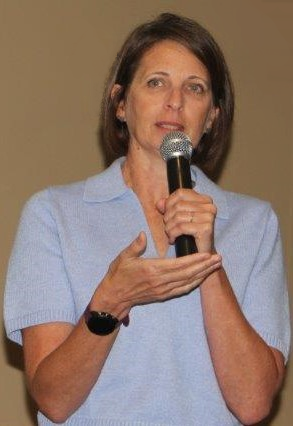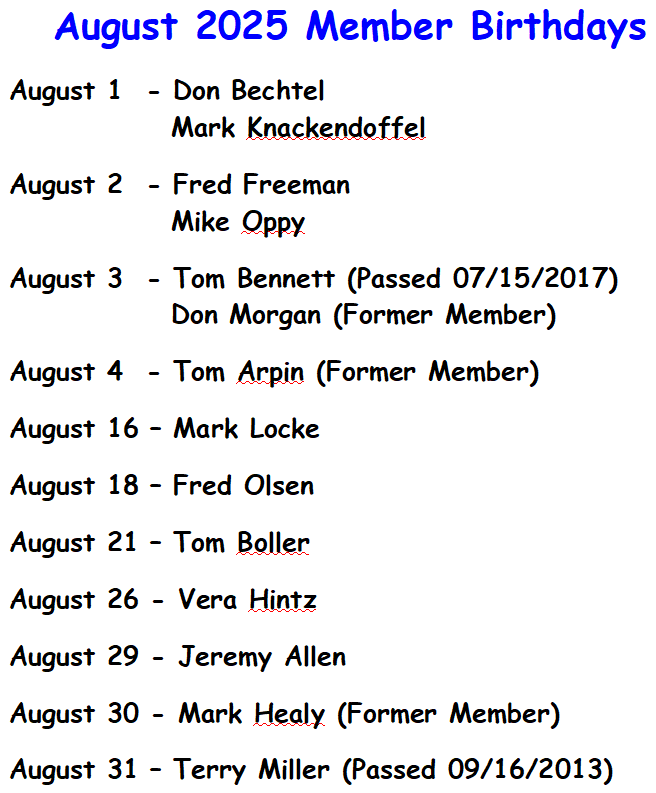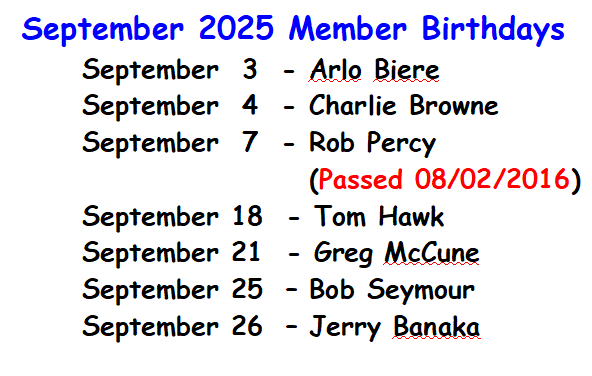The "Manhattan Optimist Club Bulletin" Vol. 2025 #43 8-20-25
VOLUME 2025 AUGUST 20 NUMBER 43
Vice President Kelly Karl welcomed everyone, and Mike Fincham gave us an Optimistic daily reflection that was followed by the flag salute.
ACHES & PAINS: Be kind always and remember to breathe in the fresh air and enjoy each day!
PROGRAM: Bruce McMillin introduced us to Stephanie Johnson, PT, MPT, who is a Kansas native and a highly experienced physical therapist who has worked in a wide range of settings over her career.
She specializes in oncology rehabilitation and active aging by addressing the specific needs and goals of her clients, based upon their individual cancer journey. She has worked alongside her husband, Scott, since the founding of Maximum Performance Physical Therapy and Fitness in 2003. They strive to provide exceptional services and care to Manhattan and the surrounding communities. Today Stephanie shared with us great information about the Comprehensive Cancer Program.- Almost 2 million new cancer diagnoses per year in the United States
- Estimated that there will be 26 million people living with cancer by 2024
- Cancer survivors are almost 3 times more likely to report fair to poor health after treatments
- Cancer survivors are twice as likely to have psychosocial disabilities and physical/functional limitations
- Cancer survivors under the age of 65 are 3 times less likely to return to work
- Cancer treatment saves lives. AND, Cancer and Cancer treatment create adverse effects on your body.
- People are living longer after treatment, and that’s changed what support looks like
- What we’re learning from other chronic illnesses is helping us rethink cancer care
- We understand more now about what keeps our cells-and our bodies – healthier longer
- Survivors are telling their stories and asking for care that goes above and beyond
Climbing Mount Everest, like going through cancer treatment, is not just about reaching the top, but being prepared for the entire journey.
Four Phases:
Phase 0: Pre-Cancer diagnosis: Let‘s get serious about quality of life and longevity before needing to climb that mountain. You need to ASSESS: general health, mental health, activity, physical function, nutrition and hydration. PREVENT: Cancer Screenings, annual physicals and health assessments. PREPARE: Based on your assessments and prevention, are there areas you need to address? Then you must identify who will develop a plan that fits you. Cancer treatment demands planning, strength, and support, not just getting through the hardest part, but to come back and recover fully.
Phase 1: Time of Diagnosis: You’re at the base of the mountain, overwhelmed by the climb and unsure where to begin.
Be organized, find resources, continue your healthy habits and prioritize your needs. Basic needs first; what are my strengths/weaknesses, what will I need if things get hard and who is on my team – do they understand their role?
Phase 2: Active Treatment: This is the steepest part of the climb. You’ll need to pace yourself, lean on your team and use your strength where it matters most. Everybody’s journey is different, there is NO one-size-fits-all. Stick to the basics and take it one step at a time. Celebrate every win, no matter how small. The climb might get tougher, but keep going, you’re making progress.
Financial Stability: Helping individuals stay employed, avoiding repeated hospital expenses, connecting with available funding and support resources.
Mental Health: Staying connected with loved ones, managing emotions in healthy ways and using effective strategies to cope with anxiety, depression and fear.
Nutrition Hydration: To keep your energy up, help you function day to day, fight fatigue and maintain the fluid and electrolyte balance your body needs to heal.
Physical Health Function: Managing fatigue and pain, supporting mobility and cardiovascular function, addressing weight loss and working to prevent serious limitations, falls and injuries.
Sleep: Vital for both physical and emotional healing. Staying asleep for several continuous hours is key – brief “Cat Naps” just don’t offer the same restorative benefits.
Phase 3: Maintenance or Treatment Completion: You’ve reached the summit, but getting back to base camp takes time and work. This stage is about recovery, not just relief. Finishing treatment doesn’t mean you’re “done,” your body and mind still need care, time, and attention.
Keep this in mind:
Don’t settle – this isn’t as good as it gets, you deserve more than just surviving. Recovery is about truly feeling well again!
Healing takes work – your energy, strength and clarity will return, but they need support.
Side effects don’t have to be permanent – if ignored, they can lead to bigger issues like long-term disability, poor health and even faster aging. (watch for lingering side effects such as anxiety, bone loss, decreased cardio function, depression high fall risk and others)
Some challenges come from the treatment itself – tissue or system injuries that take time-maybe months, to heal.
Others are habits picked up during treatment – resting more, eating differently, or moving less and they don’t always fall away when treatment ends.
Your cells start healing quickly, but full recovery can take time – some damage begins to repair in days, but deeper healing can take much longer.
After a cancer journey, base camp may not be exactly as you left it – things change – you change. The climb reshapes you in ways you didn’t expect, and returning to begin again takes time. That’s why it’s important to prepare not just for the treatment, but for the full journey. You’ll need education and planning to navigate the path ahead, a trusted team beside you – because no one climbs a mountain alone – and in a foundation of physical, mental and nutritional strength. With the right support and strategy, recovery isn’t just possible – it’s a new beginning.
Thank you, Stephanie, for this presentation. For more information email info@meadowlark.org or call 785-323-3878.
GUESTS: Mark Locke introduced his grandson, Brandon Rutherford who lives in Omaha, NE.
KSU Home Volleyball Match, Friday, September 5th at noon. Several are interested, for more information, contact Ashley Urban, Shawn Dryden, Jim Blanton or Jerry Banaka.
Save the date for the Fall Social at Optimist Park. September 21st at 5:00pm (more information to come)
Chili Crawl is coming together, October 18th is this year’s date.
Meeting adjourned with the Optimist Creed
AUGUST 27 – NOON MEETING: Program: Bronwyn Fees, Assoc. Dean, Academic Affairs, School of Family Studies: Topic: “Child Care Needs”
SEPTEMBER 3 - MORNING MEETING: Program: Garrett Seuser, Avocational Archaeologist, Teacher: Topic: “Metal Detecting History”
SEPTEMBER 10 – NOON MEETING: Program: Kendra Kuhlman, Executive Director, Manhattan Arts Center: Topic: “MAC Activities”
SEPTEMBER 17 – MORNING MEETING: Program: Larry Hoobler, Owner Operator, Triple T Farms: Topic: “Farming in Kansas & America Today”
SEPTEMBER 24 – NOON MEETING: Program: Greg McCune, Outgoing President: Topic: “Farewell Address”



